|
I-B Plans To Beat May 31 Closing Date Roundup Assistant Editor Although May 31 still remains the contemplated closing date for the Theater, Roundup learned this week that Theater Headquarters is actually aiming to "beat the deadline" by finishing the job shortly after May 15. In order to beat the deadline, if possible,
Theater strength will be about 6,100 after the sailing of the General Hersey on April 21. The third vessel in April would carry about 1,500 I-B personnel, if it is obtainable, reducing the Theater figure to 4,600. The sailing of the Marine Adder about May 3 will reduce that figure to 2,100 by taking 2,050 men home and 450 to China. It is then anticipated that the balance can be cleared on the second boat in May. CALCUTTA TRANSFER The two-week speedup was made possible by the unexpected rate at which the turnover of property is taking place in Calcutta. Theater spokesmen announced that, whereas April 15 had been the original date for the completion of turn-over of Service Forces surpluses, actually they expect that the transfer in Calcutta will be virtually completed this week. There still remains surpluses at such collecting points as Kharagpur, Ondal and Tezgaon which remain to be transferred. And there remain, spokesmen explained, odds and ends of property necessary for the maintenance of Army personnel and installations which cannot be handed over until the last moment before men leave. The turnover of Air Force surpluses in Bengal to the Tata Air Lines is also proceeding faster than expected. At one time, it was anticipated that the process might last until May 1, but Tata has now agreed to begin the takeover around April 1, and expects to finish about April 15. SAILING DATES Estimated departure times for shipping still remain: General Sturgis, 15 April; General Hersey, 21 April; Marine Adder, 3 May. Although it had been announced last December that the Calcutta to Seattle run required 21 days, Theater spokesmen told Roundup that in actual practice the ships have been averaging about 26 days to New York, and 27 or 28 days to Seattle and San Francisco. Transportation officials here stated they did not know whether or not home-going men will be permitted shore-leave in ports enroute. They explained that the I-B Theater has no control over shore-leave. They said such matters were entirely in the hands of the Troop Transport Commander aboard ship who is a Transportation Corps officer not connected with this Theater. |

Vol. IV No. 30 Delhi, Thursday, April 4, 1946 Reg. No. L5015 |

(Photo by Sgt. Francis J. Gorry, Base Section PRO photographer). |
Roundup Staff Article
All officers below the rank of Brigadier General will be reduced one grade, commencing on or about April 30, in monthly increments decided on by the War Department, Theater Headquarters announced this week. The action came as a result of a War Department radio to India-Burma and other theaters.
Non-Regular Army officers who have between 15 and 25 year's of service may request retirement but the demotion will still be effective. However, a Regular Army officer with over 25 years service may request retirement without being demoted, pending final action by the War Department on his request.
WOUNDED OFFICERS
Combat wounded officers who have received the Purple Heart and who are still hospitalized, will not be demoted until final disposition of their case is known. The same exception is made for Purple Heart wearers who have Army Retiring Board proceedings pending, where the board has found the officer permanently incapacitated at a result of his service.
The Theater announcement declared that other "individual demotion exceptions can be considered only for cogent reasons justified by the personal comments" furnished by the Theater Commander. Final approval or disapproval of an individual exception rests with the Commanding General of Army Air Forces in the case of all Army Air Force officers, and with the War Department in all other cases.
It was also announced that no more temporary promotions to the grade of Colonel will be allowed. All such promotion now pending in the War Department will be returned without action, except in the case of combat injured officers.
ORDER OF DEMOTION
It was announced that officers will be selected for the demotion in the order of their current temporary rank, beginning with those most junior.
Officers demoted will take date of rank in the lower grade as of the date of rank of their original permanent appointment or temporary appointment AUS, or temporary AUS, AC appointment in that grade, whichever is the earliest, provided service has been continuous in that or a higher grade.
Officers having been demoted one grade will not be demoted a second grade until all officers holding the temporary grade to which he was first demoted have received a one grade demotion. For example, a colonel demoted to a lieutenant colonel will not be demoted to major until all officers who were temporary lieutenant colonels at the time he was demoted to lieutenant colonel have been demoted to majors.
30 DAYS’ NOTICE
At least 30 days prior to the effective date of reduction of a particular increment, the War Department will furnish the Theater Commander with an advance list of the officers contained in that particular increment. These officers will be immediately notified by the Theater Commander that they have been nominated for reduction within approximately the next 30 days.
Fifteen days prior to the effective date of reduction the officers included in that increment will be notified of the effective date of reduction, and will then either formally accept reappointment in the lower grade or exercise one of the options available to them.
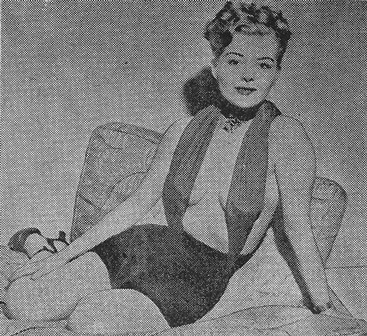
|
TRANSFER OF SURPLUS
IN ASSAM COMPLETED
CHABUA, ASSAM - Transfer of all U.S. Army surplus - property and materiel in the Assam Area Command, embracing the former Advance and Intermediate Sections, was accomplished here in simple ceremonies on March 20.
Col. Thomas W. Cooke, commanding officer of the Assam Area Command, turned over custodial responsibility of approximately 200,000 tons of surpluses to Brig. C. P. Compton of the Indian Army as enlisted men of the two armies lowered the American flag and raised the Indian pennant.
Approximately 26 installations, including the giant Chabua air base, were included in the transfer. They stretched from Tirap on the Ledo Road near Lekipani to Moran Air Depot, 50 miles south of Chabua.
Although no official breakdown of the surplus properties was made by location, officials estimated that 25,000 vehicles were on the former airstrip at Moran.
APRIL 11 EVACUATION
At the same time Base Section officials disclosed that evacuation of American personnel from Assam would be completed on April 11. Of the 2,600 officers and men stationed in the Command on March 11, more than 700 were moved out by March 21. The balance are moving to Calcutta by train in groups of 500, in movements scheduled for March 25, March 29 and April 5 with the final group scheduled to depart on April 11.
In commenting upon the transfer, Cooke said that "we will get the warehouses and the materials in the condition we would expect were the situation reversed."
Brig. Gen. W. O. Reeder, field commissioner for the Foreign Liquidation Commission; Col. A. C. Welling, G-4, USF, IBT, and Maj. Gen. E. Wood, representing the Indian government said recently that they had found all installations in excellent condition and "far better than would be normally expected under the circumstances."
Praise for the work of U.S. personnel also was expressed by Compton, who said: "Installations are in first-class order. It is obvious that the Americans spent considerable time and effort in getting them in the best possible condition, which made the turnover dead easy.
"Thanks to them, we expect to complete the turnover by the end of March," Compton said. He is in charge of the Indian troops which will occupy the transferred areas.
The Indian Army will administer the area in five main sections, he said.
Headquarters Moving April 15
Roundup Staff Article
Headquarters for I-B Theater will move from New Delhi to Calcutta on April 15. About 180 enlisted men and 70 officers will be left behind to finish closing out Delhi installations, all of whom will be on their way to Calcutta by May 6, it is planned.
The movement of the Headquarters to Calcutta will involve 198 men and 120 officers, the bulk of whom will move by rail on April 9, 11, 12 and 14. The train trip will take about 40 hours in troop specials.
Theater Headquarters in Calcutta will occupy the third, fourth and part of the fifth floor of the Hindusthani Building. Enlisted men will be billeted at 77 Park Street while officers will stay at Karnarni Estates.
Theater Headquarters Building in Delhi is scheduled for turnover to the British on April 18. A skeleton crew will continue to operate the Delhi General Depot until May 4, it is planned. Delhi's 100th Station Hospital will be closed to patients about April 8 and will be officially deactivated around April 15, according to present schedules.
Close to 100 skilled civilian employees will move with Headquarters to Calcutta.
|
Theater’s Most
Powerful Outlet
Two Years Old
CALCUTTA - In the quiet room of a house on Princes Street in Invercargill, the modern city far down in the Southern Hemisphere land of New Zealand - in the radio room of a rusty tramp shoving her blunt bow through the swells of the Indian Ocean - on a shadowed basha verandah under a corner of the Shwe Dagon Pagoda in Rangoon - in the smart grill of a Bombay cafe - and in the homes along the teeming, sweltering streets of Calcutta - the voice and music of America are known and welcome.
That America's music and the voices of her men and women are so well known in this tropical corner of Asia, and for thousands of miles south on the other side of the equator, is the result, largely, of AFRS's most powerful station in the India-Burma Theater - VU2ZU in Calcutta.
VU2ZU, which will celebrate the completion of its second year on the air on April 9, is a 1,000-watt outlet, heard, by virtue of its location, far beyond the normal reaches of stations with similar power output.
NEW HOME
And, as this radio giant moves towards its second anniversary, it also moved last week from its old home at Camp Brabourne, outside Calcutta, to the "tropical tower" of the Hindustan Building, home of the Army's Base Section Headquarters in the heart of the city.
There, on the fifth floor of the building, VU2ZU's small but talented group of program directors, announcers and engineers are continuing an 18-hour daily program, as ambitious and entertaining as that of the best commercial stations in the United States.
In addition to its long-time record of transmitting AFRS programs from the States, local news events and special features, VU2ZU's files include a number of "firsts."
The longest "remote" broadcast ever made in the I-B was accomplished last year when VU2ZU picked up and broadcast the Lily Pons-Andre Kostelanetz show at Panagarh, nearly 100 telephone wire miles away from the Calcutta transmitter.
Another technical achievement was the "Network" broadcast of the India-Burma boxing matches last year, the "blow-by-blow" description starting in Monsoon Square Gardens here and running up and through the Assam valley and over the Naga Hills to Shingbwiyang and Myitkyina - a telephone line transmission of over 1,500 land miles.
In October, 1944, when many of the men now in the I-B were still in the USA, station personnel staged a complete recreation of the World Series games in St. Louis. So realistic were the broadcasts the station actually heard reports that listeners thought the commentator, Van Mitchel, was doing the games from Sportsmen's Park radio booths. The 1945 Series also was broadcast.
FIRST GLOBESTER
The first ATC "Globester" flight also was reported by VU2ZU as Marvin Conn and Frank McGivern flew in the world-circling plane from Calcutta to Manila, broadcasting passengers' impressions on a wire-recorder unit. The same technique now is being used to broadcast the departure of troopships headed for home.
Station director and responsible for many hours of AFRS time in the I-B is T/Sgt. Howard Williams, former asst. program director and announcer at the now famed "Halfway House" in Myitkyina. A staff and special events announcer over WINX in his home city of Washington, D.C., Williams led a dance band for eight years before he went into radio. He spent five months at AFRS in Hollywood before coming to Burma.
S/Sgt. Johnny Montgomery of Wilton, Conn., who handles the news broadcasts for VU2ZU as part of his regular stint, has worked for numerous commercial stations in the United States, the last before joining the Army being WNAB in Bridgeport, Conn. Previously he had worked as announcer, writer, producer, continuity director and "MC" in Fayetteville, Ark., St. Joseph, Mo., Lincoln, Neb., Atlantic City, N.J. and New Haven and Waterbury, Conn.
Another commercial veteran is S/Sgt. Bruce MacDonald of Cleveland, O. Born in Milwaukee, MacDonald worked on radio stations in Milwaukee and Chicago before going to WJW in Cleveland as a newscaster. S/Sgt. Chuck Parker of Winnetka, Ill., was an MIT student when inducted and worked in the station at Camp Lee, Va., before joining the AFRS ranks in the I-B. M/Sgt. Jimmy Koehler is the VU2ZU engineer, gaining most of his experience as a commercial operator and in the radio service business near his home in Long Beach, Calif.
Many of the veterans of early VU2ZU transmission have gone home. Perhaps the most well-known was S/Sgt. Sebastian John Maritano, known on the air simply as "Gale Martin." A veteran of Chicago, Detroit and Columbus, O. stations, Martin operated the "Little Theater of the Air," nationally-known dramatic show. His wife is the noted Adele Kay, radio script-writer and director.
VU2ZU VETERANS
Other VU2ZU veterans include Sgt. Gordon Roth of San Francisco, former NBC announcer; Cpl. Dave McLean of Lisbon, N.D., and a veteran of four years with KFJM in Grand Fork, N.D.; Sgt. Will Jackson of Eau Claire, Wisc., who was well-known to "Halfway House" and Ledo AFRS listeners and who had commercial experience over WJMC at Rice Lake, Wisc.; and engineers Sgt. Harry Hale of Chicago and Milton Matsil of Brooklyn.
There were a host of others who have since returned to the United States - Mitchell, Jack Rollins, Michael Switzer, Ed Belford, Fred Litrenta, Jack Murchison, Bill Keating, Tom McLain, Al Epting, Will Lierheimer and Leo Pfrang to mention a few.
FAN MAIL
VU2ZU makes no claims to unusual distance of reception other than that proven by the hundreds of letters they receive. One of their most constant listeners is Arthur T. Cushen of Invercargill, noted as the "world's most southern-most city." Other listeners in New Zealand and Australia write in frequently.
There is a letter in the VU2ZU files from a girl in Rangoon, requesting a popular song for an American friend. Karachi listeners are legion. Notes come in from Bombay with comments and requests for program schedules. Seamen aboard ships in the Bay of Bengal and the Straits of Malacca hear the station regularly.
The day will come, in the not too distant future, when VU2ZU will sign off for the last time and to untold thousands in the lands of Asia there will come sadness. As one long-time resident of Calcutta wrote the other day:
"The entertainment you have given us we will always remember. When the time comes for you to leave us, our days will not be as much fun as they have been for these past two years."
Staff members of VU2ZU think that is as fitting a tribute as any they may ever receive.
|
Sylvia Wright Dreams Of Career In Hollywood
Roundup Staff Article
CALCUTTA - From Hong Kong to Hollywood is the dream sloe-eyed Sylvia Wright is cherishing these days.
The little dark-haired dancer, who has been entertaining American servicemen audiences in the I-B for the last two and one-half years, is going back to the home of her father in Hong Kong soon - and then, if present plans are carried through, she'll head for the States next fall.
A favorite of GI's since she first started her dancing on Special Service and EPU shows in Calcutta, the 18-year-old girl hit the publicity jackpot last summer when the CBI edition of Yank for August 25 featured her as their "pin-up" girl of that week.
She's danced along The Road and along the Pipeline and she's landed on almost every American-operated airport in the theater. She did a three-months stay at Camp Malir with the show "Salaam Sahibs" right after she'd toured Assam valley areas with the "Harem Holiday" production. She's probably one of the most-traveled entertainers left in the I-B.
Born in Hong Kong of Portuguese and English parents, Sylvia is the oldest of four children. Her father, a customs official of the British Government, served as a captain during the war.
TWICE ESCAPED
The Wright family twice escaped from the Japanese. Once they travelled through Jap lines in eastern China, disguised as Chinese civilians. Her father spent three months in internment camp but they won through to freedom and India early in 1943. Her mother will return to Hong Kong with her talented daughter.
Of all the cities in Asia she's seen, Sylvia likes Hong Kong best - "because it's home." She danced there, starting at the tender age of seven.
Her specialty is a "hula" which would be a hit on Broadway. She does a number of other Oriental dances - "but they're pretty much alike. Perhaps a little different step - a little different costume - a little different music, but these dances are the same, whether they come from Hawaii, Bali or Java," she explained.
She thinks the GI's have it all over any other kind of audience. "They're so enthusiastic," she explained. She thinks nearly 50,000 GI's have seen her perform.
For a time she partnered with a GI named "Frank" - she can't remember his last name - who taught her some exhibition jitterbugging routines. She likes the hula better.
Asked about her future plans, she says she hopes to go to the United States next autumn. "I know a lot of people in show business who are in the United States," she explained. "I'd like to dance in Hollywood - but who knows if I will get the chance? I dream about it," she said.
3,224 I-B GI’s Are Re-Enlisted
Roundup Staff Article
Nearly five percent of the enlisted men in the I-B Theater, a 3,224 total, have re-enlisted in the Regular Army since last October, latest figures from the Theater Adjutant General's office indicate.
But if many local citizens would have had their way, that figure would have been higher. Numerous coolies, laborers, Indian civilians and British soldiers have tried to enlist in the American Army, according to Lt. D. R. Duncan, ADMAC recruiting officer in New Delhi.
The first day the recruiting campaign open in Delhi, many coolies lined up outside the office and were quite disappointed when they were turned down.
One Indian came all the way from Lucknow to attempt to enlist in the U.S. Army after serving in the Indian Army.
An American citizen, after serving for some time in the British Army, succeeded in enlisting for one year in our army, Duncan said.
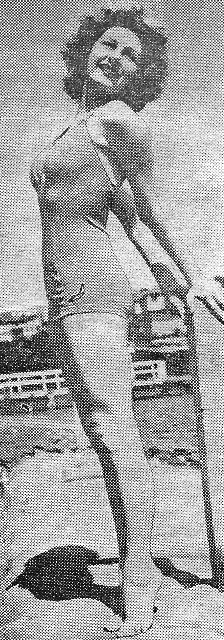 From 'down under' in Australia, 18-year-old Joan Eahey is studying to be a model. Anyone want to help with her homework?
From 'down under' in Australia, 18-year-old Joan Eahey is studying to be a model. Anyone want to help with her homework?
|
Med Supplies Turned Over
Roundup Staff Article
CALCUTTA - Base Section officials last week completed the turnover of U.S. Army medical surpluses valued at more than $4,800,000 to the Indian government.
The turnover, part of the agreement between the Foreign Liquidation Commission and the Government of India, included almost every kind of medical supplies. Drugs, hospital equipment, instruments and medical books were among the items.
The property, stored in the three medical warehouses in Base section - Bhagwati, empress of India and Chamaria - had a gross weight of 5,660 long tons.
With the transfer of this surplus depot equipment and supplies the U.S. Army has left in Base Section only the 142nd General Hospital, officials said. Previous turnovers included hospital properties and stocks in Advance and Intermediate Section areas, recently lumped under the Assam Area Command.
I-B Band Music Heard No More
Roundup Staff Article
CALCUTTA - The slip horns have stopped slipping and the drums have stopped drumming - the India-Burma Theater is a theater without a band.
De-activation of the 474th ASF Band last week followed closely the last functions of two other units, the 726th and 547th AAF Bands. The 726th had been located at Kanchrapara and the 547th at Karachi.
The 474th was activated in Base Section last July after serving on detached service for more than two years in the I-B. Members received the Meritorious Service award last November from Brig. Gen. Bob Neyland.
Prior to its de-activation, the band had played throughout the Theater. Its last leader was T/Sgt. Leo P. Vernon, of Provo, U. and its membership during the last three months consisted of low-point personnel from the other two musical units as well as newcomers to the 474th.
Of the last 15 men who were members of the band at the time of its last public appearance at a Monsoon Square Garden basketball game in early March, seven will be returned to the United States in April. De-activation of the military band also meant the end of the "Gang Busters," a swing "combo," who made their last appearance at a dinner-dance given by Headquarters Co., Base Section on March 23.
However some of the musicians who played together here in India will join forces in civilian life. T/Sgt. Charley Fisk and Sgt. Phil Rommel, the former a band leader in Kansas City, Mo., and the latter an arranger for Charley Spivak's orchestra, plan to form a hotel band of their own.
|
CHUNGKING - (UP) - Gen. Tai Li, head of the Chinese secret police and one of the most mysterious and powerful men in China, was believed dead last week after the crash of his plane near Nanking. The circumstances of his reported death were almost as mysterious as his little-known role behind the scenes in China. |
Chinese Scoff At News Mysterious Tai Li Dead
By RICHARD W. JOHNSTON
NEW YORK - Reports that Gen. Tai Li, head of the Chinese secret police, is dead probably will be greeted with skepticism by thousands upon thousands of Chinese who for years trembled at the very mention of his name.
Until last fall most Americans had never heard of Tai Li. But in China only Generalissimo Chiang Kai-shek was more widely known. Few Chinese knew him by sight. All knew him by reputation.
Like his fictional prototype, Sax Rohmer's "insidious Dr. Fu Man-chu," Tai Li moved mysteriously. His own contacts were through legions of secret agents and private armies.
I met Tai Li briefly in Shanghai last fall. He looked large and burly with an unusually heavy beard for a Chinese and round, sleepy eyes. Up to that time he had never been photographed. A little later he was pictured with Lt. Gen. George Stratemeyer when the latter awarded a decoration to "Miss Ho," a member of Tai's police armies, who had been tortured by the Japs.
BLUE SHIRTS
Before the Japanese invasion Tai Li lived in Shanghai and led a mysterious organization known as the "Blue Shirts."
He was an able organizer but many Chinese considered him a sort of Chinese Capone. When he was called into the Government he established a secret police system similar to Heinrich Himmler's Gestapo.
Tai Li had five so-called armies, some combining elements of the old warlord armies. For the last two years of the war they were the Chinese frame-work for U.S. Navy anti-Japanese espionage and weather reporting. Naval officers who spent months in the hinterland with them said Tai Li's armies fought both Japanese and Chinese Communists without particular preference.
BAD REPUTATION
Tai Li maintained 500 secret agents in Shanghai along throughout the war. They reported both on Japanese and Communist trends usually by radio.
One of his chief Shanghai operatives was a San Francisco-born graduate of the University of California. When I wrote a story about him it came back from censorship with the message: "Killed by order of Gen. Tai Li."
Tai Li's armies did not have a good reputation among the peasants. In Fukien Province farmers preferred regular Chinese Kuomintang armies, Chinese Communists or even Japanese.
Tai Li's reputation was such that the mere mention of his name would reduce prices in a curio shop. In Tsingtao I walked into an art store with a marine friend and when a cheap cigaret lighter was quoted at $15 (American) my friend said casually, "Maybe Tai Li ought to hear about this."
The proprietor took us into his back room and offered us the lighter free and our choice of anything else if we would refrain from mentioning him to the general.
The name Tai Li worked magic anywhere in China - and you needed to produce no evidence that you actually knew the man. The Chinese preferred to play it safe - and whether he is dead or not they probably will continue to do so for months and perhaps years.
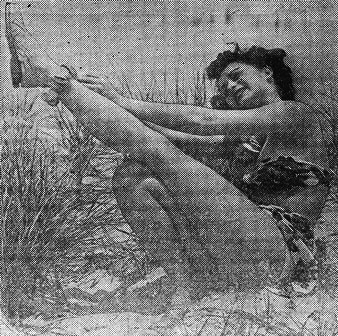 Pinch-hitting for "good man Friday" on a desert isle, Lynn King shows us a thing or two. Maybe more, hmmmm?
Pinch-hitting for "good man Friday" on a desert isle, Lynn King shows us a thing or two. Maybe more, hmmmm?
CALCUTTA - A sergeant from the Bengal Ordnance Repair Shop is hoping to uphold a famous name in baseball when he gets home from his tour of duty in the India-Burma Theater. He's S/Sgt. Bill Summers, son of the famous major league umpire of the same name. Bill Jr. plans to complete his schooling at Notre Dame, play a little baseball, then try to work his way up to the big show as an umpire. He carries a baseball rule book around with him and its pages are well thumbed. "Umpiring is a tough job, but you can't beat the hours," he says. Young Bill's father has been in the American League 14 years. He has handled four World Series. Sports scribes consider him one of the top major league arbiters and he has won recognition as basketball and football official. |
New ATC Flights Indicate
Weekly ‘Globester’ Run
New flight schedules effective April 1 were announced by the India Wing of the Air Transport Command last week. The flights to Delhi from Calcutta will cease April 15. Noted also is the beginning of four-engined planes now landing in Singapore for the first time.
The schedule is: (local time in all cases)
| | ||
| | ||
| | | |
| | | |
| | | |
| | | |
| | ||
| | | |
| | | |
| | | |
| | | |
| | ||
| | | |
| | | |
| | ||
| | | |
| | | |
| | ||
| | | |
| | | |
| | | |
| | | |
| | ||
| | | |
| | | |
| | | |
| | | |
Additionally, two ATC Contract Carrier flights and one Globester flight weekly will operate Karachi-Delhi-Calcutta and return on a schedule as yet undetermined. All other flights will be on a special mission basis.
ARMY’S FINAL BOXING STAGED AT CALCUTTA
CALCUTTA - Stocky Johnny Nuttall, Calcutta Golden Gloves light heavyweight and middleweight champion, tossed a lot of leather and connected with enough looping rights to gain a decision over the China-Burma-India junior middleweight champion, Dusty Miller of the Royal Indian Navy, in the feature bout of the final Special Service boxing meet at Monsoon Square Garden, Friday night.
The Nuttall-Miller three-rounder highlighted the 11-bout farewell card under 40th Special Service Company auspices. An estimated 4,000 fight fans saw Nuttall have things pretty much his own way after the first round, with Miller using his longer reach to keep out of the way of the heavier puncher.
Larry McLaughlin of the United States Army took an unpopular decision from Dillon Smith of the RIN in the semi-final bout. Smith's clever punching gave him the initial round but the American came back with smart counter-punching in the second canto to even the score. The third round was even-steven, with both men hammering away.
BENNETT IN SLOW BOUT
Rocky Bennett of the U.S. Army dropped a judges decision to S. Dass of the Bengal Boxing Association. It was slow and uninteresting throughout. Neither fighter showed any inclination to mix it.
Although J. Vincent (BBA) was on the canvas in each round of his three-rounder with Norm Pimlott of the Calcutta Police Force, the judges gave him credit for a strong finish and the decision. The crowd disagreed. The opening round of this bout was one of the night's best.
In the only bout between two Americans, light heavyweight Delvan Hibbert scored a TKO over Irish Bullis when the latter dropped his hands after 55 seconds of the third round and refused to continue. Bullis required medical attention in the dressing room.
COP TAKES BEATING
F. Sur of the BBA slapped Byron King of the Calcutta Police around enough in two rounds of their lightweight encounter to convince the cop he had enough. King refused to answer the bell for the third round.
Summaries of other bouts: Flyweight - C. Biscoff (Golden Gloves) beat D. Chakravarty (SOPC), N. Roundeaux (GG) shaded S. O'Leary (Police); Bantam - R. Chipum (GG) outpointed Maung Thaw (DHBC), B. Bose (GG) decisioned Sailen Sarcar (SOPC); Lightweight - Billy Stonebody (RIN) won over N. Chatterjee (SOPC)
Referees were Lieuts. Bob Smith and Andy Helland of Base Section. Bouts were arranged by Sgt. Milton Silver of 40th Special Service.
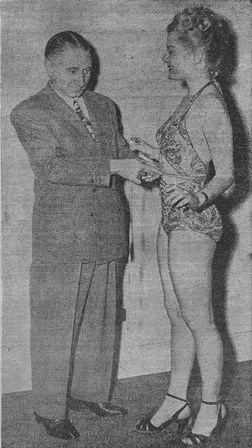 Abner Silver, author of the book, "All Women Are Wolves," takes the measurements of Doris Duane, 19, whom he selected as the "Ideal Wolfess."
Doris stands five feet seven and a half inches tall, has a 25-inch waist, and a 35-inch bust.
(Acme Photo)
Abner Silver, author of the book, "All Women Are Wolves," takes the measurements of Doris Duane, 19, whom he selected as the "Ideal Wolfess."
Doris stands five feet seven and a half inches tall, has a 25-inch waist, and a 35-inch bust.
(Acme Photo)
|
MAJORITY OF PRISONERS
IN I-B REHABILITATED
Roundup Staff Article
Seventy percent of the men permanently confined to I-B stockades under general courts martial, originally sentenced to dishonorable discharge, have been rehabilitated and restored to duty after serving an average confinement of six and a half months, Roundup learned from Brig. Gen. C. C. Fenn, Theater Judge Advocate General, this week.
In a review of general courts martial cases since the opening of the I-B Theater, Fenn told Roundup that 782 such cases have been tried. Ninety-seven resulted in acquittals and disapprovals.
This constituted an average rate of 1.39 general courts martial cases per thousand during the whole history of I-B. The rate for the Army as a whole, the JAG said, is approximately 3.5, thus providing a comparison very favorable to I-B troops.
CLEMENCY REVIEW
Under War Department direction, Theater Headquarters reviewed the trial records of all general courts martial last fall with the result that 76 out of the 99 general prisoners then permanently confined in the I-B were restored to duty.
In reviewing enlisted men's cases through the three years of I-B's existence, the period of confinement was reduced in 44 percent of the cases, dishonorable discharge was suspended or remitted in 64 percent of the cases, and only one death sentence was executed.
For the three year period the average number of cases of general courts martial for officers was .223, as compared to an overall rate for all troops of .139. Altogether, 120 officers were tried by general courts martial, of which 16 cases resulted in acquittal. Thirty-one were sentenced to dismissal from the service and 65 received forfeitures of pay or reprimands.
RETURN TO U.S.
Theater policy has been to retain in Theater stockades generally prisoners with relatively lighter sentences or for whom there was hope of rehabilitation. More serious cases were returned to the U.S. Of the 446 general prisoners sentenced in the I-B, 168 served their terms in India.
"Every effort is made to give the prisoner the impression that he can be helped out of his difficulty by proper cooperation on his part, and that the Stockade is a correctional institution and not a place where he will be "buried away and forgotten," JAG spokesmen told Roundup.
An attempt is made to determine the prisoner's civilian background, education, hobbies and so on. Work is assigned according to his previous experience. Beside recreational facilities, classroom training programs are given in such subjects as good citizenship, Articles of War, dismounted drill and map reading. Daily orientation classes on current events are scheduled.
Every day of a prisoner's life is graded under a "merit system" to determine the prisoner's progress toward restoration to duty and rehabilitation. When the prisoner has completed six months, or one third of his sentence, clemency action is begun by or for him.
Calcutta Sisters Sail To West Coast With I-B Hubbies
Roundup Staff Article
CALCUTTA - Mow on the high seas aboard the SS Marine Cardinal enroute to San Francisco are two sisters whose romances with American servicemen culminated in a double wedding here last December.
The brides are Audrey Dorothy and Nancy Jean MacKenzie, daughters of Capt. and Mrs. Thecla MacKenzie of Calcutta.
The sisters married two sergeants of the 251st Port Company. Audrey is the wife of 1st/Sgt. Del W. Roberge and Nancy married Sgt. William C. Blomer. The 251st Port Co. operated the King George V docks from which the Cardinal sailed on March 23.
Previous to her marriage, Mrs. Roberge had served for five years with the WAAF in Colombo, Ceylon. The double wedding ceremony took place at St. Thomas' church in Calcutta on December 8.
Although they are traveling together, the sisters' paths will part when they reach the California port. Sgt. Roberge will take his wife to the home of his family in Seattle while Sgt. and Mrs. Blomer will go to his home in Cincinnati, O.
|
100,000TH VET LEAVES
Roundup Staff Article
CALCUTTA - Breakfast in his bed - - er, his berth - the run of the ship and a social lion for the whole voyage is the experience now being enjoyed by T/4 Thorold E. Hallock, currently aboard the SS Marine Jumper, enroute to Seattle.
As the Buffalo, N.Y., boy walked to the gangplank of the Jumper on March 19, he walked into I-B history as the 100,000th veteran to leave the Port of Calcutta for the States.
Whereas the other 99,999 veterans had to make their own way aboard the ships tied up here at the King George V docks, Hallock had the unusual experience of being led topside by Col. Craig Smyser, Base Section deputy commander, and Col. W. L. Burbank, commanding officer of Replacement Depot No. 3.
Flanked by the two colonels, Hallock was greeted as he stepped aboard by Capt. E. G. Innes, master of the Jumper, who promised the GI all the luxuries possible during the 25-day trip back to the West Coast. The Jumper is the 34th troop transport to leave Calcutta since V-J Day.
Hallock has been in the I-B for 20 months, his last assignment being with the 691st Engineer Base Equipment Co. located at Marine Camp near the King George Docks. He is the son of Mr. and Mrs. James B. Hallock of 45 Juniata Place, Buffalo.
Unna Visits Jaipur City; Told ‘Purdah’ Losing Out
By SGT. WARREN UNNA Roundup Staff Writer
There's a spun sugar city of pure pink nestled in a mountain valley in the middle of the Rajputana desert about 200 miles south of Delhi, and its name is Jaipur.
Your Roundup reporter has always wanted to see the land of the fabulous Indian princes so last week he took advantage of an invitation to stay at the State Guest House of Sahib Bahadur Singh, Jaipur's young and handsome polo=playing Maharaja. And as State Guest Roundup got everything from a Ford touring car with chauffeur and a suite of rooms, to drinks on the house and a ride on the State camels and elephants.
Jaipur is fabulous all right. Crowning one of the mountain heights that stretch around the pink capital city is the Tiger Fort where once a year the Maharaja is permitted inside to have his pick of any gift in the vast jeweled storehouses. So safeguarded is the Fort that all the guards are hereditary and even His Highness is blind-folded when entering and not allowed to romp around inside unescorted.
PALACE OF AMBER
There is an ancient palace, called Amber, which is high up on a mountain pass near the city walls and there you can see the floating gardens and mirror-lined game rooms of the former rulers of Rajputana. And these are no mere ruins: everything has been restored to its former glory, using modern plaster and colored glass, but keeping to the original designs.
As a matter of fact, everything in Jaipur itself is being restored. The bazaar district runs along broad avenues and all the shops are uniformly pink with neat signs above them. No beggars are to be found and a clean, fresh bustling atmosphere prevails all about. This is the work of Jaipur's Prime Minister, Sir Mirza Ismail, the statesman who held that post in modernizing Mysore and who for the past three years has set about to do the same for Jaipur.
Sir Mirza invited Roundup's reporter to his home, a beautifully decorated, air-conditioned villa with indirect lighting and magnificent gardens. He told of his ideas for modernizing India's States and said it was for the best interests of both the Maharaja and his people that His Highness should be a constitutional monarch and those subjects, who meet certain property and educational qualifications, have a strong voice in running the government.
|
Sir Mirza's reforms are not confined to restoring Jaipur's cultural beauty and establishing her political security. This middle-aged, quiet-speaking man, dressed in tweeds and silk tie, is an engineer by education and he has constructed a hydro-electric plant, a municipal water purification system and is now working on the disposal of city sewage.
All this construction and revitalizing costs money, and the Prime Minister has raised it not only by drawing from the State treasury, but by selling off idle land acreage to citizens. It has paid off, for 40,000 to 50,000 of the Jaipurians are kept busy on the Maharaja's own PWA.
Shopping is a GI paradise as the dyeing, brass work and enameled crafts of Jaipur have been encouraged by royal patronage for centuries and the products are works of art.
Although perhaps 40 to 50 Americans may visit the State within a month from the Army installations at Agra and New Delhi, the prices are still within reason. There is some export trade with the U.S., too, for in one of the shops there was jewelry marked with shipping tickets for an importer in San Francisco.
Roundup's party included Miss Grace Kampen, Red Cross memsahib of New Delhi's "Duration Den," and her promenade down one of the main streets in slacks and scarf headpiece created a minor riot. Not only was a woman in pants a sensation, but most of the women of Jaipur, Hindus and Moslems, are in purdah with sarees draped over their faces.
ROYALTY
One of Roundup's hosts during the visit was the Minister of Transportation, Bhagarath Singh, the Maharaja's first cousin, a lover of American slang and a constant listener to the Armed Forces Radio Station programs from New Delhi's VU2ZY. He lives in a modernistic house with 40 servants and two wives, one in each wing of the home. The servants accumulate with marriage, the wife bringing along her maidservants and they in turn marrying the male retainers to produce children who automatically become part of the household.
:Baggie," as Singh likes to be called, told this reporter that purdah was on the way out and that one of his wives now no longer wears a veil. Roundup asked him the inevitable question: "Aren't you liable to be fooled in getting a wife?" He answered that when he was first married at 16 and lifted up his wife's hood, he was really not displeased at all. "Could have been worse," "Baggie" said.
CHUMMY NEIGHBORS
But despite the 40 servants, there was no envy for "Baggie's" home: his next door neighbor is a cobra temple where some 2,000 or more of the writhing lovelies are deposited each year. Occasionally they become neighborly, and "Baggie" told Roundup's reporter that only right after he had left the previous evening there was a "nice-sized" cobra right where the car had been parked.
Just before leaving this miraculous land where everything seems to have been made photogenic for a John Hick's Travelogue, this reporter was shown one of the loveliest sights of all. It was while on the terraced roof of the Town Hall which overlooks the City Palace and the courts. Twilight was coming on and the air was cool and fragrant. The fountains were playing and the gardens were manicured and splendid. Peacocks with their multi-colored tail feathers primly ambled down the paths. Then a constant chanting and playing of drums and horns were heard.
It was a 24-hour, perpetually-playing band, singing "Peace and Long Life" to His Highness. And the quiet, cupola-domed city with its jewel-laden Tiger Fort looking down on the valley from the peaks above seemed to be pretty good insurance that Sahib Bahadur Singh would continue to prosper in his pink and progressing land of Jaipur.
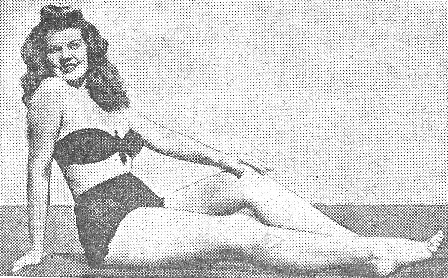 Elizabeth Vance, a student at the University of Houston, Texas, cuts a pretty figure. We don't have the measurements, but she
certainly fills this space to advantage. Right?
Elizabeth Vance, a student at the University of Houston, Texas, cuts a pretty figure. We don't have the measurements, but she
certainly fills this space to advantage. Right?
|
Delhi Has Only Two VD Cases For Last Month
Roundup Staff Article
"There were no cases of VD in the Delhi area during January and February of this year and only two in March, one of them a recurrence," Capt. M. D. Kerwin, ADMAC Area Surgeon, announced this week.
The zero rates for January and February compare with the rates per thousand men per year of 204 and 254 in the Calcutta area. The Theater rates for these two months were 84 for January and 118 for February.
According to Kerwin, the Delhi VD rate for American personnel has always been low, partly due to more pleasant living and social conditions and partly because of adherence to out-of-bounds regulations concerning the city of Old Delhi. "Nowadays the men know they are going home soon and don't want to take any chances," he said.
The last peak in the Delhi rate was in June, 1945, when the ADMAC area had a rate of 20.66 per thousand per year; Calcutta 120; and the Theater as a whole, 34.
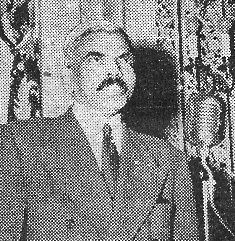 In Washington, Sir Ramaswani Mudaliar, India's chief delegate to the UNO Assembly, speaks before the national Press Club.
Sir Ramaswani, also head of an Indian delegation seeking a 4,000,000-ton grain allocation from the Combined Food Board, appealed to the U.S.
to assist his country in averting a famine "which threatens to litter the pavement of India with dead."
(Acme)
In Washington, Sir Ramaswani Mudaliar, India's chief delegate to the UNO Assembly, speaks before the national Press Club.
Sir Ramaswani, also head of an Indian delegation seeking a 4,000,000-ton grain allocation from the Combined Food Board, appealed to the U.S.
to assist his country in averting a famine "which threatens to litter the pavement of India with dead."
(Acme)
|
Most of 61 I-B ‘Replacements’ Going to China
Roundup Staff Article
Most of the 61 I-B replacements who arrived in India on the Marine Jumper two weeks ago will go to China on this Theater's quota of 450, Roundup learned this week, although 18 of the men have been assigned to Theater Headquarters in New Delhi.
Pvts. Samuel Attkisson and Kenneth Anderson said they thought they expressed the feelings of most of the 61 when they declared that they are not too upset about coming overseas at this late date in order to make return possible for GI's who have been here a while.
Attkisson said, "As long as we can stay put in the same place for a while, it's not too bad. We're glad to settle down almost anywhere after being pushed around for the past few months from Fort Riley in Kansas to Fort Jackson, S. Carolina and to Ft. Lawton in Seattle."
Anderson said most of the group had hoped to go to the ETO, as long as they had to come overseas, rather than India. They reported that times had changed greatly for the GI in the States now, estimating that the time was not far off when "No Dogs or Soldiers" signs would start appearing again.
Although most of the group average about 11 months service, about 15 of the replacements have children. One of the replacements assigned to Theater Headquarters has 41 points, over two years of service, served with the 10th Armored Division as a tank gunner in the Rhineland and Central Europe campaigns and has a bronze star and two battle stars.
Prosecution Rests In First U.S. War Crimes Trial In SEAC
Roundup Staff Article
The presentation of American evidence against W/O Tomano Shundo, charged with the beheading of two American enlisted air crew men in Indo-China, took only two hours, as the first U.S. War Crimes case in S. E. Asia got underway in Singapore last week.
Lt. J. W. Sands presented the case for the prosecution which consisted principally of affidavits from three French civilian internees and five Jap soldiers.
The defense was granted a recess until April 1 to bring witnesses from Saigon to the court in Singapore.
Shundo is charged with responsibility for the beheading of T/Sgts. Allen W. Nicks and Joseph A. Demaria, of the 529 Squadron, 380 Bomber Group. The crime was alleged to have been committed near Long Tanh airfield at Saigon in July 1945. Nicks and Demaria had been prisoners of the Japanese since their B-24 crashed 30 kilometers from Cholon, Indo-China on June 12, 1945.
Most damaging evidence came from Cpl. Yoshiwo Kawai's affidavit, in which the Jap soldier stated, "I saw Tomono use a Chinese sword and strike the American with it on the back of the neck. The head was not completely severed. I only remember one blow being struck. The man died immediately, his body rolling forward down the pile of dirt into the hollow in the ground."
|
CALCUTTA PLANS FASHION SHOW
CALCUTTA - GI's in the Calcutta area who want to see what their fond wives or sweethearts would look like in a slinky Indian sari will have their chance here on Wednesday, April 10 when the local Red Cross "Burra Club" will present a new kind of fashion show.
Marine Cardinal Has Close Shave
Roundup Staff Article
CALCUTTA - There was exactly one inch of water under the keel of the San Francisco-bound Marine Cardinal as she started down the muddy Hooghly on the afternoon of March 25 - a good-sized minnow could have put her aground and delayed her sailing for six days.
The Cardinal came up the river drawing 24 feet, 10 inches of water astern where the bulk of her fuel oil was stored, and about 20 feet even under her bow. Redistribution of the oil evenly throughout tanks the full length of the ship was accomplished by early morning, leveling her off at about 22 feet displacement.
The weight of the 3,315 passengers who boarded her drove her keel down toward the mud again until she was 24 feet, 11 inches deep in the water. At highest tide the Hooghly is only 25 feet deep over three different sand bars.
Transportation Corps officials said that if she had been delayed as much as one-half hour, tide conditions would have prevented her sailing until March 29, thus necessitating the unloading of all passengers.
Home-Bound WAC’s Enjoyed I-B, But Still Glad To Board Ship
Roundup Staff Article
CALCUTTA - Tall, laughing M/Sgt. Helen Roberts, who has seen a lot of Asia in the two and one-half years she has been overseas, wondered aloud last Saturday morning in the dim shed of Pier No. 2 of the King George V docks.
"I haven't seen my home in Cleveland, O. for nearly three years - wonder if I'll recognize the place," she said.
One of the last 10 WACs in the India-Burma Theater, Sgt. Roberts was on the first ship to bring WACs to what was then the CBI Theater. First assigned to duty in Delhi, she also has been stationed in Calcutta, Ceylon and Singapore.
"It has been a lot of fun," she said, "but I'm glad I'm going home now. The other girls feel the same way about it, too."
The "other girls" nodded. All five of them had arrived in Calcutta a few days before flying in from their last assignments in the U.S. Liaison Detachment offices in Singapore.
T/Sgt. Mary Roberts of Oxford, Ala. - she's no relation to Helen - has had 18 months overseas service as has T/3 Margaret Lufbke of St. Louis. T/Sgt. Dorothy Troppman of Poughkeepsie, N.Y. and T/3 Edna Humrighouse of Port Washington, O. have been overseas for 10 months.
The five have been in Singapore since their offices moved there from Ceylon four months ago. They couldn't make up their minds which part of Asia they liked best.
There are five other WACs still in Singapore, Helen said. She didn't know how long they would stay there, "but I think they'll be coming along soon," she said.
The five girls, dressed in khaki slacks and shirts, filed aboard the SS Marine Cardinal shortly after noon Saturday amid the appreciative whistles of GI's lining the rails. Like their brothers in uniform, the last wave they gave to India was of the "it's been nice knowing you, India, but we're damned glad we're going home" variety.
 Actress Ava Gardner is supplying plenty of cheesecake photos these days. Any objections?
Actress Ava Gardner is supplying plenty of cheesecake photos these days. Any objections?
|

Is the Gateway to India at Bombay Really as beautiful as they say? You got it right, gal and the town's okay Modern and cosmopolitan, like the posters say East meets West, and what a show Stayed at the Taj, so I should know But give me Kashmir with a houseboat and moon Or Mussoorie or Nainital ... during the monsoon It's Delhi and Lahore in the wintertime With Dancing and parties and gin and lime. Surely you saw a burning ghat, Fakirs, rope trick, and all of that. Naturally, kid, you ought to know I always get around, where the smart people go. The rope trick's the bunk, but there's plenty to see; Maharajas, swamis, yogis, and for a very small fee. Just bakshees the gateman and say you are Yanks And the joint is yours with salaam and thanks. They've got their rackets just like in the States, But it's beliefs and religions; they use different baits. |
|
CONVERSATION PIECE - 1946
(Apologies to Sgt. Dawless) Anonymous Central India Air Depot APO 884 Of course you found the Taj Mahal The loveliest building of them all. You haven't lived chum, 'til you've seen it at night Escorting a chick that's somewhere near right. Yeh, Agra's all right for beauty and glamour But I'll take Chowringhee with its taxis and clamor; Firpo's and Prince's and the "300" too; Calcutta's a place where you find things to do. And a guy got along with the WAC's at the "Mill." Then there's Bangalore and Kandy, 'Per Diem Hill.' You've been gone two years this spring, Couldn't you pull a single string? Can't understand why they kept me there When the war'd been over more than half a year. I did my part; even volunteered To drive the Stilwell Road when it'd all been cleared. 'Points' were okay for the ETO - Things were different in Europe y'know. With heat and malaria we had it rough, But when the fightin' stopped, we hadn't 'points' enough! |
The Roundup is a weekly newspaper of the United States Forces, published by and for the men in Burma and India, from news and pictures supplied by staff members, soldier correspondents, Army News Service and United Press. The Roundup is published Thursday of each week and is printed by The Statesman in New Delhi and Calcutta, India. Editorial matter should be sent directly to T/Sgt. Charles Kellogg, Hq., U.S.F., I.B.T., APO 885, New York, N.Y., and should arrive not later than Saturday in order to be included in that week's issue. Pictures must arrive by Friday and must be negatives or enlargements. Stories should contain full name and organization of sender. Complaints about circulation should be sent direct to Roundup Distribution Officer, Base Section APO 465, New York, N.Y. Units on the mailing list should make notification of any major change in personnel strength or any change of APO.

|
APRIL 4, 1946
Original issue of India-Burma Theater Roundup shared by Russell L. Barnes in memory of his grandfather, Wayne Osten.
Similar, better quality image of Ava Gardner used in this re-creation.
Copyright © 2018 Carl Warren Weidenburner
TOP OF PAGE PRINT THIS PAGE ABOUT THIS PAGE SEND COMMENTS
PREVIOUS ISSUE CLOSE THIS WINDOW THE LAST ROUNDUP
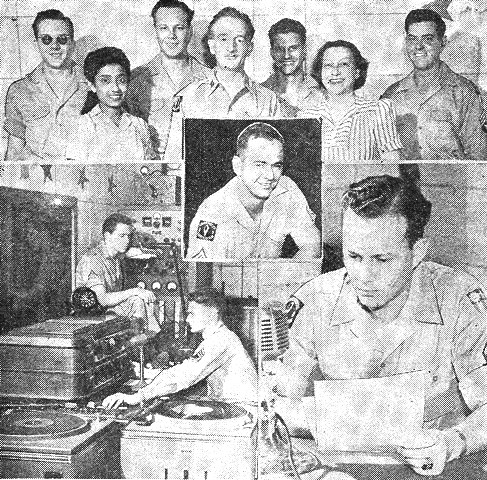 (Top) Men and women of VU2ZU, Calcutta.
Left to right: S/Sgt. Chuck Parker, announcer; Davie Mitchel, stenographer; T/Sgt. Howard Williams, station director; Capt. Charles Boyle,
Base Section I & E Officer; M/Sgt. Jimmy Koehler, engineer; Lorna Hanson, librarian; and S/Sgt. Bruce MacDonald, announcer.
(Inset) S/Sgt. Johnny Montgomery, newscaster-announcer.
(Left) Koehler watches his dials as Parker looks on during the changeover from the former location at Camp Brabourne to the "Tropical Tower"
of the Hindustan Building.
(Right) Williams at the mike in the new studio "A" ready for a "live" show.
(Top) Men and women of VU2ZU, Calcutta.
Left to right: S/Sgt. Chuck Parker, announcer; Davie Mitchel, stenographer; T/Sgt. Howard Williams, station director; Capt. Charles Boyle,
Base Section I & E Officer; M/Sgt. Jimmy Koehler, engineer; Lorna Hanson, librarian; and S/Sgt. Bruce MacDonald, announcer.
(Inset) S/Sgt. Johnny Montgomery, newscaster-announcer.
(Left) Koehler watches his dials as Parker looks on during the changeover from the former location at Camp Brabourne to the "Tropical Tower"
of the Hindustan Building.
(Right) Williams at the mike in the new studio "A" ready for a "live" show.
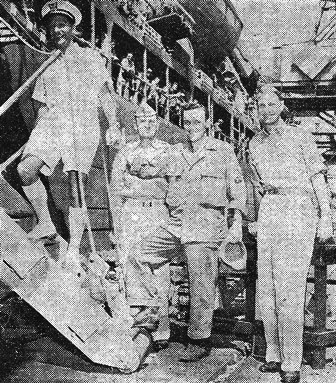
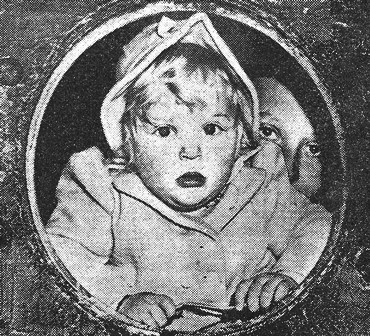 Little 16-month-old Lavon "Bunny" Woolever, who was born in Mussoorie, India peers in amazement through a porthole on her arrival
at East Boston from India. Her brother, Charles, 17, is in the rear. They are the children of Rev. and Mrs. Charles Woolever, missionary
workers from Ashtabula, Ohio. (INP)
Little 16-month-old Lavon "Bunny" Woolever, who was born in Mussoorie, India peers in amazement through a porthole on her arrival
at East Boston from India. Her brother, Charles, 17, is in the rear. They are the children of Rev. and Mrs. Charles Woolever, missionary
workers from Ashtabula, Ohio. (INP)
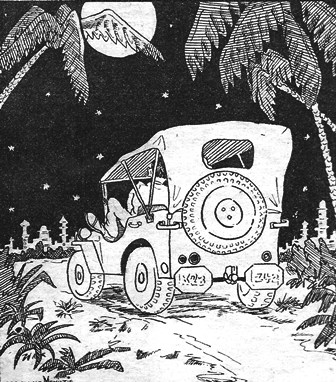 "Good Heavens Wilbur . . . I thought enlisted men were different!"
"Good Heavens Wilbur . . . I thought enlisted men were different!"